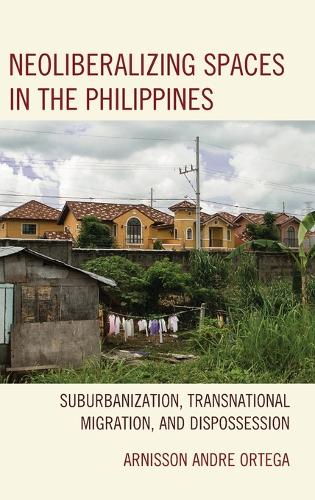
Neoliberalizing Spaces in the Philippines: Suburbanization, Transnational Migration, and Dispossession
(Hardback)
Available Formats
Publishing Details
Neoliberalizing Spaces in the Philippines: Suburbanization, Transnational Migration, and Dispossession
By (Author) Arnisson Andre Ortega
Bloomsbury Publishing PLC
Lexington Books
9th September 2016
United States
Classifications
Professional and Scholarly
Non Fiction
Development studies
Politics and government
307.7409599
Winner of Virginia A. Miralao Excellence in Research Award 2017
Physical Properties
Hardback
370
Width 162mm, Height 234mm, Spine 32mm
708g
Description
Amidst the recent global financial crisis and housing busts in various countries, the Philippines booming housing industry has been heralded as Southeast Asias hottest real estate hub and the saving grace of a supposedly resilient Philippine economy. This growth has been fueled by demand from balikbayan (returnee) Overseas Filipinos and has facilitated the rise of gated suburban communities in Manilas sprawling peri-urban fringe. But as the Filipino dreams of successful balikbayans are built inside these new gated residential developments, the lives of marginalized populations living in these spaces have been upended and thrown into turmoil as they face threats of expulsion. Based on almost four years of research, this book examines the tumultuous geographies of neoliberalization that link suburbanization, transnational mobilities, and accumulation by dispossession. Through an accounting of real estate and new suburban landscapes, it tells of a Filipino transnationalism that engenders a market-based and privatized suburban political economy that reworks socio-spatial relations and class dynamics. In presenting the literal and discursive transformations of spaces in Manilas peri-urban fringe, the book details life inside new gated suburban communities and discusses the everyday geographies of privileged new property ownersmainly comprised of balikbayan familiesand exposes the contradictions of gated suburban life, from resistance to Home Owner Association rules to alienating feelings of loss. It also reveals the darker side of the property boom by mapping the volatile spaces of the Philippines surplus populations comprised of the landless farmers, informal settler residents, and indigenous peoples. To make way for gated communities and other profitable developments in the peri-urban region, marginalized residents are systematically dispossessed and displaced while concomitantly offered relocation to isolated socialized housing projects, the last frontier for real estate accumulation. These compelling accounts illustrate how the territorial embeddedness of neoliberalization in the Philippines entails the consolidation of capital by political-economic elites and privatization of residential space for an idealized transnational property clientele. More than ever, as the Philippines is being reshaped by diaspora and accumulation by dispossession, the contemporary moment is a critical time to reflect on what it truly means to be a nation.
Reviews
Based on rich empirical material and detailed analysis [Ortega] exposes the logics of contemporary Philippine development that is built on accumulation by dispossession. Hailing himself originally from a village that forms part of todays sprawling suburbs of Metro Manila, Ortega is able to present a grounded, reflexive and compassionate account of those who bear the cost of neoliberal urbanization in the Philippines. The wide-ranging ethnographic overage of sites and angles, most significantly offering perspectives of life both inside and outside of the gated communities, sets this book apart from other treatments of the subject. The individual chapters together provide a multidimensional account of neoliberal (sub)urbanization, allowing Ortega to convincingly show the connections that span the local and the transnational, the inside and outside of gated communities, and the historic processes of dispossession with contemporary ones, that together sustain neoliberal accumulation.... This book is essential literature for readers who want to understand processes of globalisation, economic development and urbanization unfolding in the Philippines and beyond. It is an impressive work of thorough and engaged scholarship that exposes the complex, entangled and relational geographies of socio-spatial transformations in contemporary Southeast Asia, that take courage, patience and persistence to unravel. A truly compelling read and inspiring achievement! * Singapore Journal of Tropical Geography *
This book is a multidimensional interpretation of the role of real estate development in the neoliberal restructuring of Philippine urban space, focusing of the growth of suburban development in the periphery of the Manila metropolitan region in the last few decades. Ortega has produced a major contribution to our understanding of urban development in the neoliberal era in the Philippines and Southeast Asia more generally. -- Terry McGee, University of British Colombia
This engagingly-written book provides a critical geographic analysis of the Filipino Dream. Rather than focusing on the labor geographies of Filipinos seeking to make better lives for themselves overseas or the economic geographies of their remittances home, Arnisson Andre Ortega examines the (sub)urban spatial expression of migrant and diasporic aspirationsgated, world class real estate. Venturing beyond the gates of peri-urban Manila and scratching beneath the glossy veneer of prestige and progress, Ortega unearths powerful landscapes of dispossession that are matters of both contemporary neoliberal urbanization and inherited inequities. -- Tim Bunnell, National University of Singapore
This innovative study provides important new insights on the political economy of urban development in the Philippines. With great ethnographic detail, Ortega shows how the actions and identities of overseas Filipinos, narratives of nation-building, and real estate come together to form a critical mode of neoliberalization in the twenty-first century. -- Katharyne Mitchell, University of Washington
The Philippines is on the leading edges of the worlds urban revolution. This book is required reading for anyone who wants to understand this revolution and the reconfigurations of capital, culture, and property on the frontier between gated-community and family-values-based suburban domesticity and the violent dispossessions of farmers, squatters, and indigenous peoples. -- Elvin Wyly, University of British Columbia
Author Bio
Arnisson Andre Ortega is assistant professor at the University of the Philippines Diliman.
